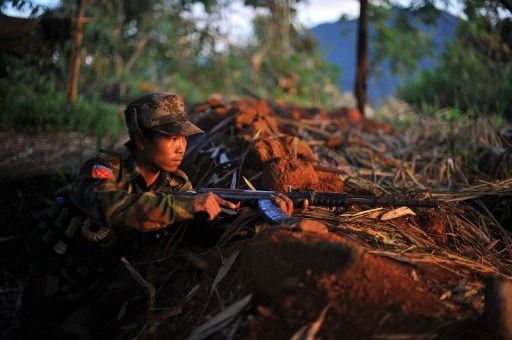From 11-12 September 2013, an ethnic delegation led by Saw Htoo Htoo Lay, Saw Ta Doh Moo from the Karen National Union, Sai La, Sai Ngeun from the Restoration Council of Shan State, Lian Sakhong from the Burma Centre for Ethnic Studies, and Harn Yawnghwe from the Euro-Burma Office met with the government’s peace making technical team led by Hla Maung Shwe. The meeting was the first major step towards solidifying the peace process and creating a substantial nationwide ceasefire agreement based on the framework created by the Working Group for Ethnic Coordination.
There has been constant discussion, often motivated by concerns in relation to trust and individual control issues, between all ethnic parties in relation to the negotiation process. However the September meeting, and its outcome, was able to allay many of those concerns and put forward a mutually agreeable framework that could see a nationwide ceasefire by the end of November thus laying the groundwork for an all inclusive political dialogue before the 2015 election.
The nationwide ceasefire, and its implementation as early as possible, is an essential first stage in securing the environment for a future political dialogue. Previous agreements have been characterised by frequent territorial incursions and sporadic clashes. It is hoped, therefore, that a nationwide ceasefire agreement will provide a much more comprehensive mechanism for dealing with such occurrences and will establish joint ceasefire committees responsible for monitoring and settling disputes.
While previous agreements have often contained similar points, they have been ill-defined and territorial boundaries and codes of conduct have been neglected by both sides. The nationwide ceasefire, which includes the provision for the acceptance of a mutually binding code of conduct, will provide a much more all-encompassing agreement including detailed references to humanitarian assistance, troop redeployment and clearly defined areas of operation.
That said, however, a number of detractors in armed ethnic groups still remain and air concerns in relation to the precise timing of a nationwide ceasefire. The Kachin Independence Organisation (KIO), which has had experience dealing with previous military governments, remains sceptical and has demanded that political dialogue should be conducted prior to a ceasefire. The United Nationalities Federal Council (UNFC), which is largely influenced by the KIO, maintains that it alone should negotiate with the government thus removing individual armed groups ability to negotiate on behalf of the people they represent.
While the KIO has changed a number of its demands in an effort to negotiate with the government, its involvement with the UNFC, and those of other members, has tied it to following the UNFC position. Most recently the UNFC has collaborated with the United Nationalities Alliance (UNA) which is comprised of ethnic political parties that had contested the 1990 election. The UNA has agreed to work with the UNFC in rewriting the constitution and is also working with the National League for Democracy in writing constitutional amendments.
There is little doubt that constitutional amendments need to be made and neither the government nor the majority of armed ethnic groups disagree on the subject. All relevant actors are prepared to see changes made to the constitution, what remains is the problem of recognising the importance of a nationwide ceasefire prior to constitutional reform, political dialogue and finally the emergence of a federal union.
Two of the largest armed actors, the Karen National Union (KNU) and the Restoration Council of Shan State (RCSS) have distanced themselves from the UNFC’s position noting that it is up to individual groups to decide their political destiny. As a result, as the September meeting shows, they are prepared, quite correctly, to move forward with a nationwide ceasefire regardless of the dictates of other armed ethnic groups. While previously, especially at the time of the predominance of the KNU at Manerplaw, ethnic alliances were considered infallible, the environment over the past two years has changed.
A number of ethnic leaders, perhaps understandably, maintain an almost cold war era attitude in relation to the current Burmese government. And it is this attitude that could threaten the peace process and thus endangers any opportunity for the people of their respective states to progress. This, added to the various voices of special interest groups, primarily based outside of the country, adds to the negative image of the process and thus weakens any attempt by armed ethnic groups to move forward.
In reality, most stakeholders, armed ethnic groups, the government, and opposition political parties have admitted that they are prepared to accept the same thing: a nationwide ceasefire, political dialogue, constitutional amendments and finally a federal union. While these voices differ in how to achieve such goals, it is the first time that all sides have agreed on the same issues.
It is quite clear that there is still a long way to go before achieving the said goals, but the time for procrastination is over. A nationwide ceasefire – which, one must note, does not entail the disarmament of armed ethnic groups – is a necessity now, not later. As has often been the case throughout this long conflict, the need for dialogue amongst ethnic groups has often outweighed the need for action. Now is the time to lay down a strong foundation for political dialogue that envisions a future federal union and it is imperative that minor political differences be yielded to achieve this goal.
Paul Keenan is Senior Researcher at the Burma Centre for Ethnic Studies and author of “By Force of Arms – Burma’s Armed Ethnic Groups”.
The views expressed in this article are the author’s own and do not necessarily reflect DVB’s editorial opinion.



